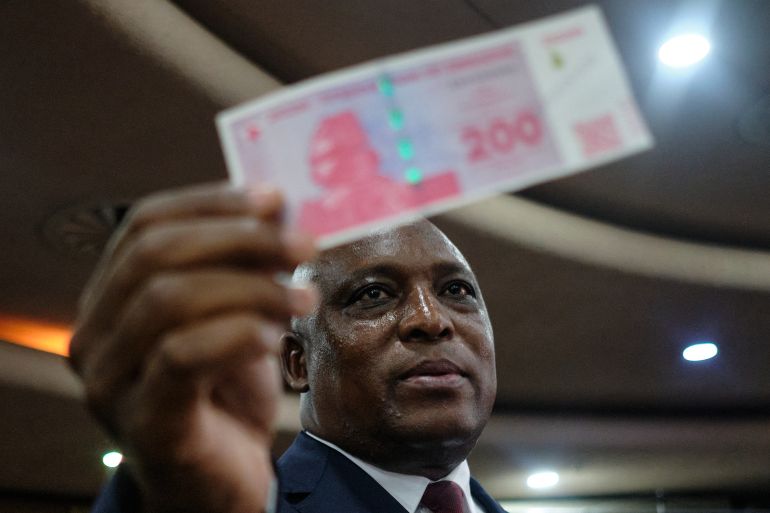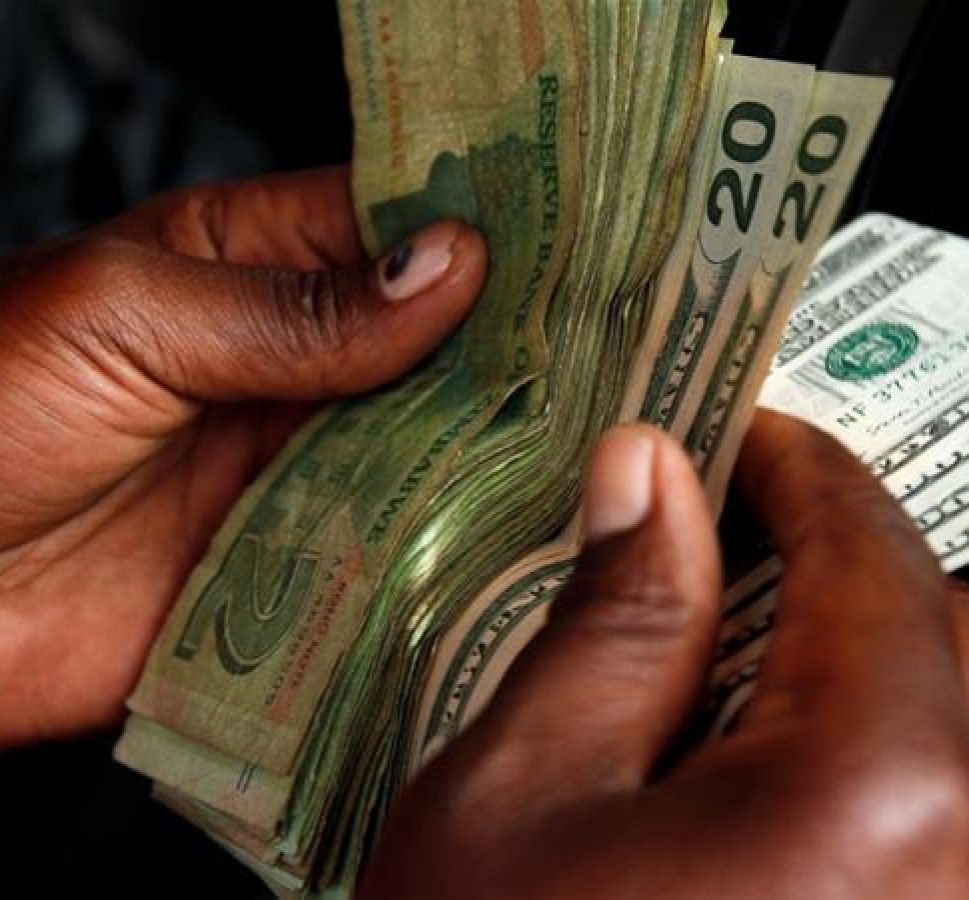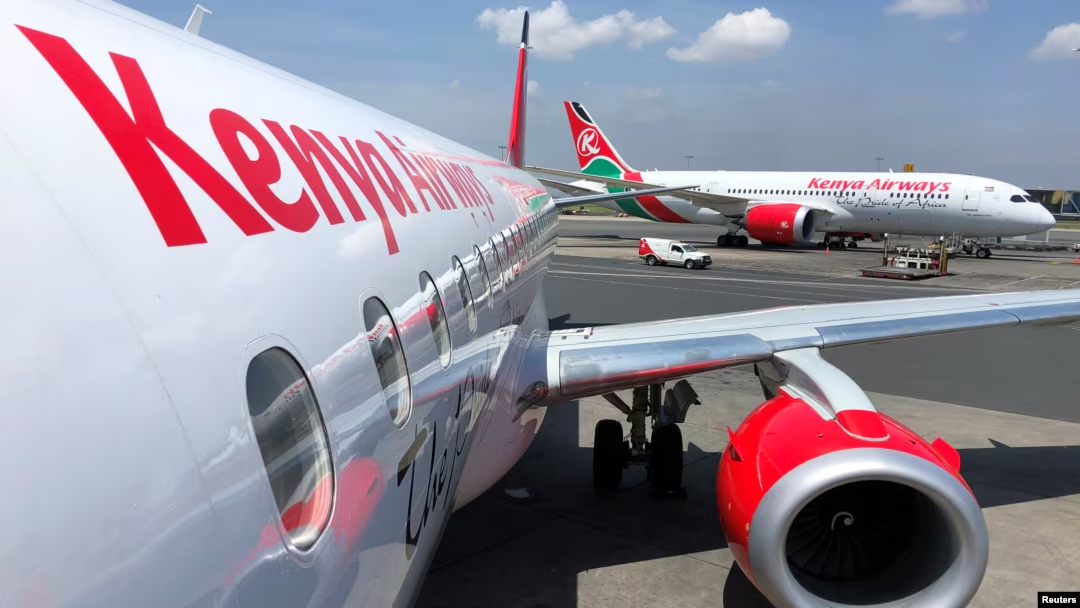
Harare, Zimbabwe – The entrance to the main gate at the Budiriro shopping centre, a busy mall south of Zimbabwe’s capital Harare, used to be a hive of activity where informal forex dealers had set up makeshift “offices” on the pavement.
Now the area is all but abandoned.
The smartly dressed young boys and middle-aged men who would stealthily trade foreign currency with shoppers have not set foot there in weeks to avoid police raids.
In Zimbabwe, which has been beset by a decades-long economic crisis characterised by hyperinflation, a 54 percent unemployment rate and highly volatile local currencies, the more stable United States dollar is the preferred medium of exchange.
Everyone from state utilities to street vendors accepts payment in US dollars. Because of the popularity of the greenback, black market forex dealing is a thriving side hustle with thousands earning a living from the practice.
In April, in the government’s latest attempt to stabilise the economy, Zimbabwe’s central bank launched a new currency, Zimbabwe Gold, or ZiG.
Soon after, Zimbabwean police began cracking down on informal forex dealers and arresting them in their numbers. The authorities blame illegal currency dealing for distorting the exchange rate and devaluing the local currency, and want to ensure the ZiG is accepted and does not lose value rapidly like its predecessor.
To date, more than 70 street forex dealers have been arrested. But instead of curbing them, it has driven them underground and towards more creative means of doing business.

At a tuck shop about a kilometre from where he used to work at Budiriro shopping centre, forex dealer Darlington Murazva* has set up a makeshift office.
The stocky 30-year-old scrolled through the WhatsApp messaging app on his Samsung smartphone, and pressed play on a voice note that arrived in a group chat he’s in with other foreign currency dealers and vendors.
“The police are in Glen View right now. They didn’t find anyone,” the voice said.
Murazva, who has been a forex trader for 11 years and mostly operates informally, used to have a strategic spot at the entrance to the mall where he would sit on a plastic stool scouting for passing shoppers.
When the police raids started, he and the other traders fled. They are now positioned all over Harare – and give one another a heads-up about movements of the police.
“Now, the police can’t find us. We are always two steps ahead,” he said with a wry smile.
“We know where they are in real time through our fellow traders in the surrounding areas.”
Pockets of opportunity
The biggest sources of foreign currency in Zimbabwe are diaspora remittances and exports. Zimbabwe allows its citizens to open USD accounts where they can deposit or receive the greenback. They can also withdraw hard USD notes from banks. Companies can also source forex from the official auction market.
Away from official channels, though, people regularly buy and sell USD to informal forex dealers depending on their needs. Because street dealers offer better and more market-driven rates of exchange, Zimbabweans prefer to deal with them instead of banks or official currency exchanges.
Black market dealing is illegal, so the exact number of traders is not known. But it is thought there are a couple of thousand. The WhatsApp group Murazva belongs to has 247 members.
Though usually in competition with one another, the dealers have set aside their rivalries to join forces and help one another avert arrest.
Recent reports that went viral on social media saying 60 arrested dealers were sentenced to three years in jail have also created jitters in an already unnerved community.

Moving online has not only been a safety measure for dealers but also a new way for some to continue conducting business.
Steven Tambudze*, 40, who has been a forex dealer for almost half of his life, said WhatsApp has been a real boon in recent weeks.
“Although this has been a very difficult time for other dealers, business has been very good for me,” Tambudze told Al Jazeera at the Highglen cross-border bus terminus, where he waited for a client.
“Most of my deals come through WhatsApp now,” he said.
Some of his former clients who he lost track of because they started trading with other dealers in the city have also returned, he said, explaining that with the raids people prefer to deal with someone they know and trust, and now reach out to him directly by phone and messaging app.
Tambudze said he never meets random people and only deals with clients he personally knows.
Murazva also uses WhatsApp to continue working. However, he is cautious. He never mentions the word ZiG on an actual phone call and never talks about exchange rates or anything that may identify him as a dealer, out of fear the authorities may be listening in.
When he gets a call, he tells potential clients to chat with him over WhatsApp, which he said he trusts a bit more because of its end-to-end encryption.
“One must never give safety a day off,” he told Al Jazeera.

‘Keeping our heads above water’
On the streets, forex traders all have their own ways of approaching customers. At the mall, Murazva would sit on his plastic chair at the entrance until he spotted a potential customer. In a hushed tone, he would then approach the passerby with a whispered deal to change dollars into local currency or vice versa.
Over WhatsApp, clients now contact a dealer they know when they are looking for currency. The dealer then posts a message on the WhatsApp group letting the other traders know they would like to make a currency exchange.
Other interested traders get in touch via inbox with an offer and a rate is agreed.
From there, a payment in local currency is made electronically through a bank account and a physical meeting is arranged for the collection of the hard USD cash.
The dealers in the group are a community who know each other and therefore have a level of trust.
Other traders also use WhatsApp’s broadcast feature, which allows users to send a single message to multiple recipients simultaneously with one click.
The recipients of a broadcast cannot see each other, ensuring privacy. This comes in handy for forex dealers who are trying to lay low and still earn a bit of income.
“The broadcasts are also helping a lot and are far more convenient because one can reach a number of dealers,” Tambudze said.
Murazva is grateful to messaging apps for helping dealers eke out a living amid the turmoil.
“If it wasn’t for WhatsApp groups, we would have starved. We are keeping our heads above the water,” he said.
The veteran dealer feels the police onslaught is a passing phase.
He said this was because when the central bank introduced the bond notes, a currency that forms part of the Zimbabwe dollar, in 2016, the police launched a similar blitz.
“The police operation is not new. We are used to them. Whenever they introduce a currency, we get arrested,” Murazva said. “But they will stop soon.”
Stopgap measures
The new ZiG currency is already devaluing against the US dollar. To date, the currency has depreciated by as much as 25 percent on the black market and is trading at Zig20:USD1. Officially, the rate is about Zig13.5:USD1.
Harare-based economic analyst Rashwhit Mukundu said the fast devaluation speaks to a lack of confidence in the local currency.
However, authorities blame the decline of the ZiG and the collapse of its predecessor on the black market foreign currency dealers. They say dealers pay much more than what is offered at the official rate, driving the currency down as it depreciates against the US dollar.
Informal dealers reject the idea that they are to blame.
Meanwhile, economists and critics accuse the central bank of flooding the market with local currency which is then used to buy US dollars from street forex dealers. Local government contractors, who are usually paid in local currency – which amounts to billions in bank notes – then trade these notes for US dollars on the black market, causing an oversupply, which fuels inflation.
“The real challenge in this economy is lack of confidence in the local currency because people have lost their savings and capital to hyperinflation in the past,” said Gift Mugano, a visiting professor of economics at the University of Zimbabwe Business School.

He told Al Jazeera the arrest of forex dealers was a stopgap measure to deal with the currency crisis, but not a wise idea.
“The question is: how do we restore confidence? You don’t arrest people to foster confidence. The moment you force people, you lose the plot,” he said.
For Mugano, the clampdown is a sign that the authorities have simply “run out of ideas” on how to deal with the currency problem.
“The black market is still thriving. Government is refusing its own money to pay for passports, fuel and other services,” he said.
Mukundu, meanwhile, said the police clampdown was an exercise in futility.
“It’s a case of stitching up one’s behind to stop a diarrhoea. The Zimbabwean government and the central bank are not addressing the fundamental issue of lack of confidence in the Zimbabwean currency,” he told Al Jazeera.
For Mukundu, past experiences with inflation and ongoing economic crises make people want to hold on to US dollars and other stronger currencies over their own.
“The people of Zimbabwe now see value and wisdom in storing economic value in foreign currencies,” he said. “It’s a culture and economic system that has been built over the years that supports storing value in such currencies.”






